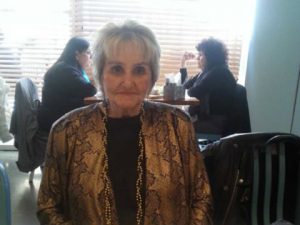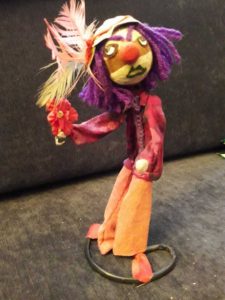Sophie Libo-Wawrzyniak
 Sophie Libo-Wawrzyniak, (1935-2018), an artist who survived the Holocaust, during the different periods of her life, created a diverse collection of dolls based on her fascinating world.
Sophie Libo-Wawrzyniak, (1935-2018), an artist who survived the Holocaust, during the different periods of her life, created a diverse collection of dolls based on her fascinating world.
Sophie Libo-Wawrzyniak was born in Vilna (formerly Poland) in 1935 to her father Dr. Alexander Libo and her mother Vera Libo - an opera singer.
Sophie had one sister – Luba - three years older than her. Sophie is from a well-known family of doctors in Vilna. Her great-grandfather was Dr. Zemach Shabad, a social and political activist and one of the founders of YIVO (Yiddish Scientific Institute), a physician who inspired ‘Dr. Aybolit’ in the poem “Aybolit and Barmaley” by Korney Chukovsky, a well-known figure in Russian children's literature, similar to Dr. Doolittle.
Her grandmother, Dr. Rosa Shabad -Gavronska- was a well-known pediatrician in Vilna and a member of the board of directors of OZE-TOZ (Society for the Protection of the Health of the Jews).
Her father, Dr. Alexander Libo, was an ENT specialist, and after the war was chairman of the Association of Jews from Vilna and the Vicinity in Israel.
Born in 1935, Sophie, spent most of the war under an assumed identity, living with her mother's voice coach. Sophie's parents and her sister were hidden in the Benedictine Monastery in the city of Vilna by the nun, Sister Maria Mikulska and the Reverend Father Juozas Stakauskas - recognized by Yad Vashem as Righteous Among the Nations.
Sophie has only two memories of her grandmother:
The first memory is from the Christmas before the outbreak of the war: Grandma Rosa and Grandma Nadja bring two dolls as a holiday gift - the doll Nadja for Sophie and the doll Rosa for her sister. Sophie begs her sister to exchange the dolls and ‘pays’ for the replacement with a teddy bear, in addition to the doll.
The doll Rosa accompanied Sophie throughout the war, and she has kept the doll's head with her to this day.
The second memory testifies to Dr. Shabad-Gavronska’s devotion to the children who were her responsibility. Sophie says that her grandmother was preoccupied with the orphanage and the fate of the orphans, while she, a little girl, was jealous of the unfortunate children: "They were really tiny and cute, but I was her granddaughter. I am her granddaughter, so why does she dedicate most of her time to them and not to me?" Sophie, trained as a construction engineer, made aliyah in 1958 and for about 40 years has been creating the artistic dolls from wire, wood, fabrics and paper pulp. The dolls' collection covers various subjects - folk tales, the world of movies and the theatre, Bible stories, and more. The Holocaust is mainly expressed in the dolls collection "Silent Feelings," "The Sacrifice of Isaac," "Rendezvous," and "A Party in My Fantasy Garden”.
Her The work expresses Sophie childhood fears, and her attempts to cope with them as an adult. Their creation allows her to voice her feelings.
Sophie says that she has always been attracted to dolls. She looked for ways to express herself both in art and sculpture but did not succeed, "until I discovered the dolls.” Before making aliyah in 1959, she studied and worked as a construction engineer. A decade later, with no previous experience, she began creating the dolls. The same year, she had her first exhibition, with the encouragement of the poet and director Anda Pinkerfeld-Amit at the Mania Bialik Women's House. She was re-inspired by the repeated shelling of Galilee settlements and Operation Peace for Galilee. She traveled north and began exhibiting her work in community centers, kibbutzim, and moshavim. The exhibition appeared in various places such as: Kiryat Shemona, Safed, Metula, Yesod Hamaala, Kfar Masaryk, Kibbutz Baram, and more.
Two important works of hers dealing with the Holocaust were donated to museums. In the museum of Kibbutz Lohamei Hagetaot can be found the work "Janusz Korczak" and in the Yad Vashem Museum the work called "The Orphanage in Vilna," documenting the place and the director who perished in the Holocaust, Dr. Szabad-Gavronska, Sophie's grandmother.
In 1958, Sophie made aliyah with her husband. She is an artist who describes life in the Vilna Ghetto using dolls that express her childhood fears, and her attempts to cope with them as an adult. Their creation allows her to voice her feelings.
The Doll's Voice is Silent / from Reuven Leib's blog
Sophie Libo-Wawrzyniak, the doll artist, died in Tel Aviv. She was a Holocaust survivor. She participated in a Roman Polanski film. She defined herself as "an eternal optimist.”
The artist Sophie Libo-Wawrzyniak, whose works are known in Israel and Poland, died about two weeks ago in Tel Aviv.
Sophie left behind a collection of hundreds of dolls, made using a combination of wood, fabric and metal techniques, while creating colorful figures from the Bible, the Holocaust, aliyah and children's fairy tales. Her work on the Holocaust was donated to the Yad Vashem Museum, and other works were donated to Kibbutz Lohamei Hagetaot. Art lovers, doll collectors, and visitors to her dozens of exhibitions around the country expressed their sadness at the announcement of her passing.
Sophie was born in 1935 in Vilna, part of Poland at the time. Joel Ofek, the artist's son, said yesterday, that upon the German occupation, the Christian nanny Jadwiga-Widje Markowska concealed Sophie in several hiding places, but Sophie's Judaism was exposed. She was expelled from the ghetto, and again hidden by the last person who hid her, Mrs. Desao, later recognized as a Righteous Among the Nations.
Her parents, Vera and Alexander, and her older sister Luba, survived by hiding in a convent. At the end of the war, Sophie reunited with her family. Paradoxically, Sophie's parents and sister were hidden in a convent which also served as the Gestapo's headquarters. Nine Jews hid with them for a year and a half. Rosa Szabad-Gavronska, Sophie's grandmother, director of the orphanage and a member of the Vilna Judenrat, did not survive. When she learned that the ghetto was about to be liquidated, instead of fleeing, she went to her death with the children she refused to abandon.
After the war, Sophie married engineer Jacek Wawrzyniak, a Christian in love with her, who accompanied her when she made aliyah in 1958. Sophie had two children. In the late 1990s, Sophie's Polish roots caught the attention of Polish television, which produced and aired a documentary about her varied life. The film won second place at a Polish documentary film festival, but that did not end Sophie's connection to the world of the cinema. In Poland, Sophie was a friend of director Roman Polanski (then at the start of his career). Thus it happened that she participated in his first short film - "Two Men and a Wardrobe."
Sophie was a construction engineer, but her fondness for art was revealed when she began sewing dolls for her children. Over the years, the hobby became a profession, and in 1971, her first exhibition was held at the Mania Bialik Women’s House in Tel Aviv. Over the years she held dozens of exhibitions at various sites, including the American Zionist House and the Bible House, and in 1982 she exhibited in many Galilee communities, desiring to bring joy to the children of the Galilee who had endured the war. Until her last days, Sophie looked for a suitable home for all the dolls she had created, that they could continue to talk about feelings of happiness and sadness even after her death. Almost until her last day, she held exhibitions of her work.
At the end of her life, Sophie specialized in making mask sculptures from burnt clay. Despite her difficult childhood and her struggle with poor health, she never lost the joy of living, calling herself an "eternal optimist."
Sophie's son, Joel Ofek, an English lecturer, said yesterday: "My mother's death is a loss causing great grief. However, I feel I have been privileged to be the son of such a special personality, both weak and strong. Thanks to her I am what I am today. I lived under the wings of an artistic mother - a beautiful woman and a little girl in the same breath. Thanks to her I was exposed to the art world, to visits with her in exhibitions in Israel and abroad, and to endless attendances at the theater performances she loved so much. I have no doubt that thanks to her I graduated with a Master's Degree in the Performing Arts. She may not be with me physically, but will certainly accompany me all my life. "


